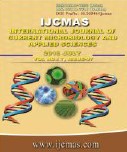


 National Academy of Agricultural Sciences (NAAS)
National Academy of Agricultural Sciences (NAAS)

|
PRINT ISSN : 2319-7692
Online ISSN : 2319-7706 Issues : 12 per year Publisher : Excellent Publishers Email : editorijcmas@gmail.com / submit@ijcmas.com Editor-in-chief: Dr.M.Prakash Index Copernicus ICV 2018: 95.39 NAAS RATING 2020: 5.38 |
Cashew (Anacardium occidentale L.) is an important tropical nut crop of social and economic importance worldwide. World’s total area under cashew cultivation is around 35100 km2. Despite the economic importance of cashew with increasing cultivation globally, the crop is threatened with the problems of low yield with world’s average raw cashew nut yield is as low as 780 kg ha-1. The present low productivity is due to establishment of plantation with seedling of non-descript origin, poor and irregular flowering, poor fruit set and premature fruit drop, low hermaphrodite flowers, inefficient pollination and nutritional deficiency etc. Plant growth hormones are gaining its importance for managing canopy, ensuring uniform flowering and enhancing fruit retention and yield under commercial cultivation for perennial fruit trees including cashew. Despite the importance of growth hormones to increase yield, their uses on cashew are limited despite daunting production challenges. In this review, we focus to understand how the endogenous hormones regulate the stages of plant growth in order to make exogenously applied plant growth hormones to play an important role in maximizing cashew nut yield. Although little works on effect of hormones existed in cashew, we show that cashew yield can be maximized through hormones by overcoming problems associated with plant growth, fruit set and final retention.
 |
 |
 |
 |
 |